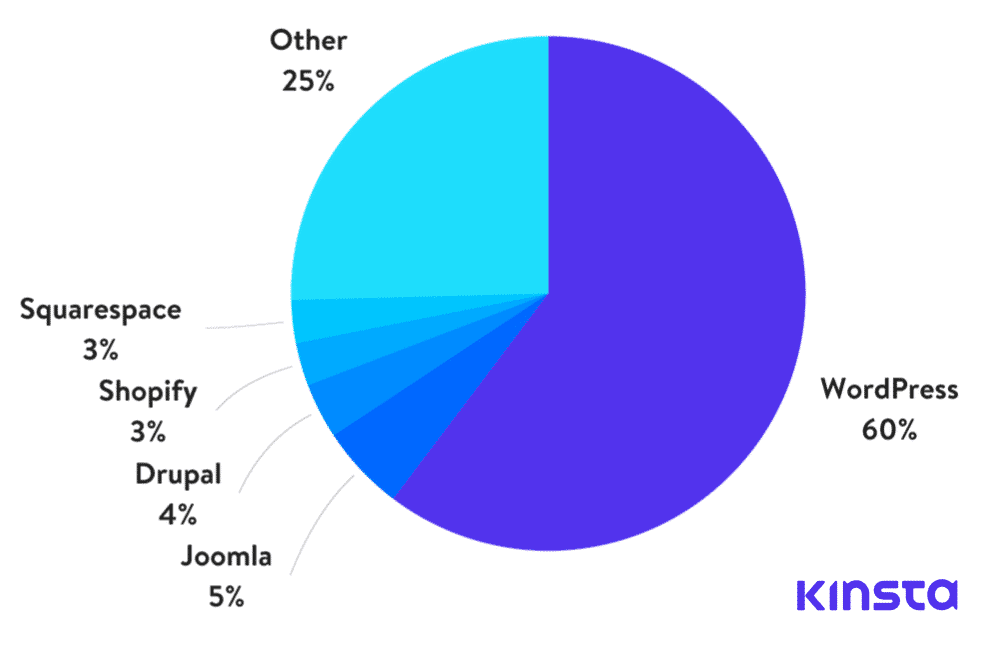
Valentina
Il futuro di WordPress entro il 2025
WordPress has come a long way since its launch in 2003 as a simple blogging platform. Today, it powers over 40% of all websites, including some of the world’s most popular sites, such as The New York Times, CNN, and Forbes. But what does the future hold for WordPress, and where is the platform headed by 2025?
In this article, we’ll explore some of the key trends and developments that are shaping the future of WordPress and what they mean for website owners, developers, and users alike.
 WordPress’s dominance as a CMS platform can be attributed to several factors. Firstly, it is a free and open-source platform, meaning anyone can use, modify and distribute it without any cost. This has made it accessible to millions worldwide who can’t afford to pay for expensive proprietary software.
WordPress’s dominance as a CMS platform can be attributed to several factors. Firstly, it is a free and open-source platform, meaning anyone can use, modify and distribute it without any cost. This has made it accessible to millions worldwide who can’t afford to pay for expensive proprietary software.
Il dominio come piattaforma CMS
WordPress è una delle piattaforme di Content Management System (CMS) più dominanti oggi disponibili, con una quota di mercato globale di oltre il 40% di tutti i siti web. Secondo W3Techs, una società di sondaggi sulla tecnologia web, ad aprile 2023 WordPress alimenta il 42,8% di tutti i siti web. Si tratta di un numero sbalorditivo, soprattutto se si considera che oggi ci sono oltre 1,8 miliardi di siti web. WordPress’s dominance as a CMS platform can be attributed to several factors. Firstly, it is a free and open-source platform, meaning anyone can use, modify and distribute it without any cost. This has made it accessible to millions worldwide who can’t afford to pay for expensive proprietary software.
WordPress’s dominance as a CMS platform can be attributed to several factors. Firstly, it is a free and open-source platform, meaning anyone can use, modify and distribute it without any cost. This has made it accessible to millions worldwide who can’t afford to pay for expensive proprietary software.
- WordPress è facile da usare e ha una bassa barriera all'ingresso, il che lo rende ideale per i principianti e gli utenti non tecnici. Offre una vasta gamma di temi e plug-in che possono essere utilizzati per personalizzare l'aspetto e la funzionalità di un sito Web senza richiedere alcuna conoscenza di codifica.
- WordPress ha una comunità ampia e attiva di sviluppatori, designer e utenti che contribuiscono al suo sviluppo e forniscono supporto agli altri. Questo approccio guidato dalla comunità ha aiutato WordPress a evolversi e adattarsi alle mutevoli esigenze dei suoi utenti, rendendolo una piattaforma versatile e adattabile.
- WordPress è SEO-friendly, il che significa che è progettato per aiutare i siti Web a posizionarsi più in alto nelle pagine dei risultati dei motori di ricerca (SERP). Questo lo ha reso popolare per le aziende e i privati che vogliono migliorare la propria visibilità online e attirare più traffico sul sito.
WordPress Verso il 2025
WordPress ha fatto molta strada dal suo inizio nel 2003 ed è ancora in crescita ed evolversi rapidamente. Mentre ci avviciniamo al 2025, ci sono diverse aree chiave in cui possiamo aspettarci di vedere WordPress continuare a svilupparsi e innovare.- Crescita continua e dominanza:
- Maggiore attenzione all'accessibilità:
- Enfasi su velocità e prestazioni:
- Maggiore utilizzo dell'intelligenza artificiale e dell'apprendimento automatico:
- La continua evoluzione dell'editor a blocchi:
- Maggiore enfasi sulla sicurezza:
- La crescente importanza del mobile:
